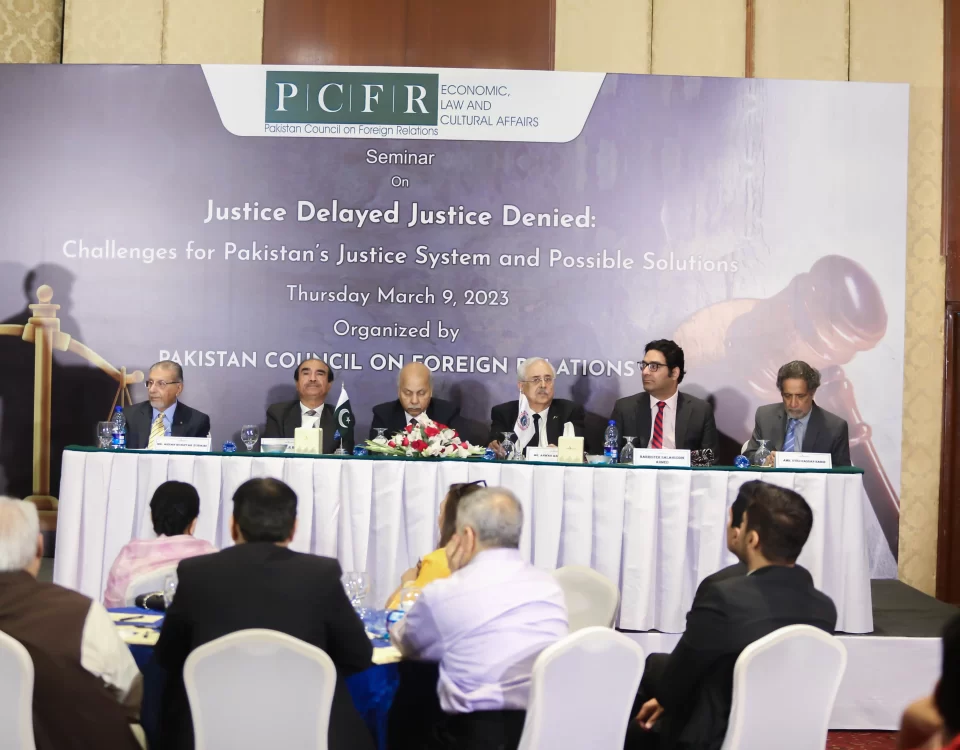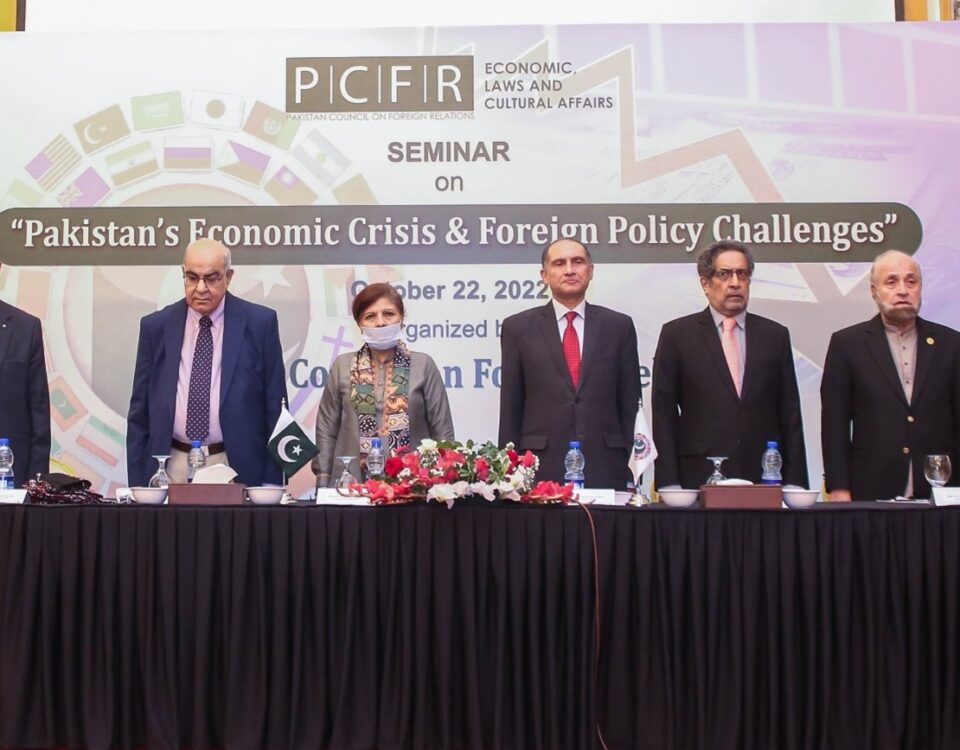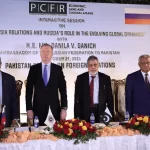
Pakistan – Russian Relations and Russia’s Role in the Evolving Global Dynamics
October 21, 2022
Dinner in Honor of H.E. Dr. Brahim Romani
December 14, 2022
Pakistan – Russian Relations and Russia’s Role in the Evolving Global Dynamics
October 21, 2022
Dinner in Honor of H.E. Dr. Brahim Romani
December 14, 2022Pakistan’s Economic Crisis and Foreign Policy Challenges
On October 22, 2022, Pakistan Council on Foreign Relations (PCFR) organized a Seminar on “Pakistan’s Economic Crisis and Foreign Policy Challenges” in Marriott Hotel Karachi. Dr. Shamshad Akhtar former Governor State Bank and Ambassador Aizaz Ahmed Chaudhry Director General of the Institute of Strategic Studies, Islamabad & Former Foreign Secretary of Pakistan address the seminar. The seminar was attended by Karachi based Consular Corps, business elite of the city, former ambassadors of Pakistan, government officials, academics, and researchers.

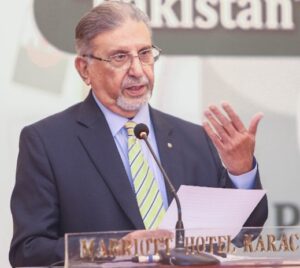 Mr. Ahsan Mukhtar Zubairi Secretary General PCFR presented the welcome address and also highlighted the achievements of the Council. While highlighting the significance of the seminar, Mr Zubairi maintained that since independence Pakistan has been exposed to various economic challenges and due to which we have struggled in our relations with other countries particularly with the great powers. Mr. Zubairi further said that the situation today is not different from past where we lack indigenous growth, currency devaluation, energy crisis, current account deficit, higher imports, and catastrophic floods have impacted our economy. The vulnerable economic conditions along with changing global dynamics have unveiled a number of challenges on foreign policy fronts.
Mr. Ahsan Mukhtar Zubairi Secretary General PCFR presented the welcome address and also highlighted the achievements of the Council. While highlighting the significance of the seminar, Mr Zubairi maintained that since independence Pakistan has been exposed to various economic challenges and due to which we have struggled in our relations with other countries particularly with the great powers. Mr. Zubairi further said that the situation today is not different from past where we lack indigenous growth, currency devaluation, energy crisis, current account deficit, higher imports, and catastrophic floods have impacted our economy. The vulnerable economic conditions along with changing global dynamics have unveiled a number of challenges on foreign policy fronts.
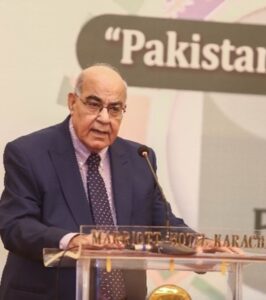
Ambassador Shahid M Amin Chairman PCFR, presented the opening remarks that set the stage for discussion on the subject of seminar. Ambassador Amin maintained that the economic health and foreign policy are intrinsically linked, and weak economy limits foreign policy options while strong economy presents more choices in dealing with other countries. Ambassador Amin further highlighted that is constantly changing we should not put all our eggs in one basket and be more prudent in maintaining our relations with other countries particularly with the U.S., Russia, China, Saudia, and Iran.
 Dr. Shamshad Akhtar addressed the seminar as the first speaker and presented her thoughts on “Pakistan’s Economic Challenges: Present and Future”. Dr. Akhtar highlighted the risks and vulnerabilities of Pakistan’s economy and insisted that some of them surmounted because of our own faults and others because of global issues. She maintained that exposure to climate vulnerabilities, recurrent economic crisis, investment-saving gap, low productivity, and urban sprawl which encroaches agricultural and industrial land, are some of the critical problems of our economy. Dr. Akhtar presented the statistical figures to underscore the impact of a number of factors on our economy that include recent floods, trade deficit, energy crisis, low import tariff regimes, non-competitive exports, regional political turbulence and uncertainties.
Dr. Shamshad Akhtar addressed the seminar as the first speaker and presented her thoughts on “Pakistan’s Economic Challenges: Present and Future”. Dr. Akhtar highlighted the risks and vulnerabilities of Pakistan’s economy and insisted that some of them surmounted because of our own faults and others because of global issues. She maintained that exposure to climate vulnerabilities, recurrent economic crisis, investment-saving gap, low productivity, and urban sprawl which encroaches agricultural and industrial land, are some of the critical problems of our economy. Dr. Akhtar presented the statistical figures to underscore the impact of a number of factors on our economy that include recent floods, trade deficit, energy crisis, low import tariff regimes, non-competitive exports, regional political turbulence and uncertainties.
Dr. Akhtar proposed that in order to deal with these problems we have to tighten our fiscal belt and and few ways to achieve that include progressive tax reforms, revision of national finance commission award, withdrawal of a number of tax benefits, lowering the subsidies particularly of power sector, and consolidation of the development program where most of the investments are handled by the private sector. She concluded that this can only be done through sound economic management that include skillful and prudent macroeconomic management and preparation to manage uncertainties and risks associated with exogenous shocks.
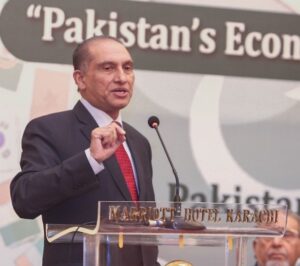 Ambassador Aizaz Ahmed Chauhdry shared his thoughts on “Pakistan’s Foreign Policy Challenges amidst Economic Vulnerabilities” during the session. Ambassador Chaudhry started with highlighting the basic factors that determine the course of foreign policy. He emphasized that Pakistan’s foreign policy has been driven national, regional, and global factors such as governments’ priorities, economic wellbeing, geographic location, global and regional dynamics. Ambassador Chaudhry further elaborated that the U.S.-China competition, Ukraine-Russia war, evolving situation in the middle east, climate change, and non-traditional security threats are critical global factors that impacted the foreign policy choices for Pakistan in the recent times.
Ambassador Aizaz Ahmed Chauhdry shared his thoughts on “Pakistan’s Foreign Policy Challenges amidst Economic Vulnerabilities” during the session. Ambassador Chaudhry started with highlighting the basic factors that determine the course of foreign policy. He emphasized that Pakistan’s foreign policy has been driven national, regional, and global factors such as governments’ priorities, economic wellbeing, geographic location, global and regional dynamics. Ambassador Chaudhry further elaborated that the U.S.-China competition, Ukraine-Russia war, evolving situation in the middle east, climate change, and non-traditional security threats are critical global factors that impacted the foreign policy choices for Pakistan in the recent times.
While highlighting regional scenarios 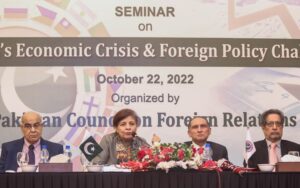 that effect Pakistan’s foreign policy choices, Ambassador Chaudhry maintained dealing with Modi’s India has become a serious challenge which cherish the goal of RSS to establish a Hindu state and attain policing role across the region. Unstable Afghanistan is another regional factor that determine Pakistan’s foreign policy, Ambassador Chaudhry said. He further said that absence of peace in Afghanistan will not only be challenge for Afghans and the region but also for the entire world.
that effect Pakistan’s foreign policy choices, Ambassador Chaudhry maintained dealing with Modi’s India has become a serious challenge which cherish the goal of RSS to establish a Hindu state and attain policing role across the region. Unstable Afghanistan is another regional factor that determine Pakistan’s foreign policy, Ambassador Chaudhry said. He further said that absence of peace in Afghanistan will not only be challenge for Afghans and the region but also for the entire world.
Ambassador Chaudhry proposed in order to deal with the foreign challenges, we need to follow a path where we rely on our own 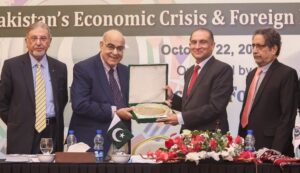 strengths, consider development at the first, make foreign policy by setting aside egos and emotions, balancing then relations between the U.S. and China, look for other development partners in the nearby regions and beyond, and reorient relations regional countries based on narrative of development and peace.
strengths, consider development at the first, make foreign policy by setting aside egos and emotions, balancing then relations between the U.S. and China, look for other development partners in the nearby regions and beyond, and reorient relations regional countries based on narrative of development and peace.
The event was followed by lively question and answer session that generated a healthy debate. Ambassador Syed Hassan Habib senior board member presented the vote of thanks and acknowledged the worthy speakers and distinguished dignitaries for their presence.



